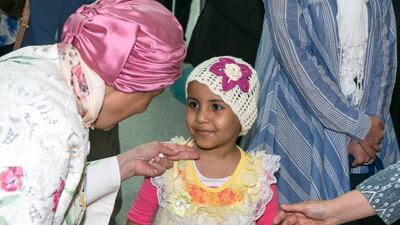The National staff
CAIRO // Sheikha Jawaher bint Mohammed Al Qasimi, wife of the Ruler of Sharjah and Chairwoman of the Supreme Council for Family Affairs, is calling for a global collaboration by governments and private organisations to fund autism research.
At the Daycare Centre for Autistic Children at Abbasiya Mental Hospital in the Egyptian capital, Sheikha Jawaher said: “Autism prevalence figures are on the rise, making it the fastest-growing spectrum disorder in the world with an estimate of one in 100 children being on the autistic spectrum.
“Increased financial support for research could help scientists to determine its causes, which could help these children to lead normal lives.”
Sheikha Jawaher said there was a need for collaborative efforts by doctors and scientists worldwide to identify the causes of autism and work towards finding an effective treatment.
Autism is a neurodevelopmental disorder that affects 1 per cent of the world population.
“Every child suffering anywhere in the world touches our hearts and makes us feel their pain physically or psychologically,” she said. “When medical experts stand powerless to find an effective solution to autism that prevents young people having access to education and playing with their peers due to the condition, it saddens us all.
“This is why these healthcare facilities are important. They play a key role in supporting these children psychologically and rehabilitating them to give them and their families hope.”
newsdesk@thenational.ae

